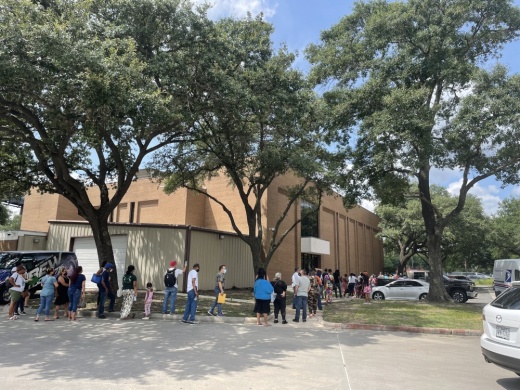The Centers for Disease Control and Prevention extended the eviction moratorium Aug. 3, just after it was scheduled to expire July 31. It remains in place for any areas, including Harris County, that are “experiencing substantial and high levels of community transmission levels,” according to the CDC order.
At the same time, Harris County began distributing a new $30 million round of relief July 28 for residents struggling financially as a result of the COVID-19 pandemic.
“The economic impacts of the pandemic haven’t ended. The hospitality industry, the entertainment industry, in all those industries, workers haven’t come back,” said Jay Malone, Gulf Coast AFL-CIO political director, at an in-person financial assistance event Aug. 3. “Working people who don’t get paid for months are not going to be able to pay their rent. ... We need to start planning to make sure that people aren’t out on the street as a result.”
Between July 28 and Aug. 11, Harris County residents are eligible to apply for one-time payments of $1,500. The payments can be used toward rent or any urgent expense, such as groceries, utilities or car payments. The program is funded by federal relief funds distributed to the county through the American Rescue Plan Act. A previously established rental relief fund through the city of Houston and Harris County is also still open.
Residents can apply for the direct assistance at www.harriscountyrelief.org and the rent-specific relief at www.houstonharrishelp.org.
While having a moratorium in effect is helpful for renters, thousands have still been unable to avoid eviction, Malone said.
“The situation is catastrophic, ... and it was already catastrophic before the [scheduled] end of the moratorium,” Malone said.
Just prior to the pandemic, the highest single-day number of eviction filings was 827, according to data from analytics firm January Advisors. Throughout the course of the pandemic so far, various eviction protection measures, including the CDC moratorium, have been enacted and expired or extended. Since mid-March 2020, the highest number of evictions filed in a single day was 408.
One reason the moratorium has reduced evictions but not reached everyone is because tenants have to fill out a declaration form and present it to a judge to receive protection from the CDC order. The process adds errors and loopholes to the order’s intended purpose, said Jeff Reichman, an analyst with January Advisors. Reichman has been tracking eviction data since the beginning of the pandemic.
About 13% of those facing eviction in Harris County presented a declaration form, Reichman found. Of those, half had their case dismissed. The rest were delayed or carried through, he found.
“Only about 13% of defendants are making these declarations, and of those who made those, almost half of them are hanging by a thread,” he said. “When we say ‘a moratorium on evictions,’ that sounds like no one’s getting evicted, and that’s just not true.”





